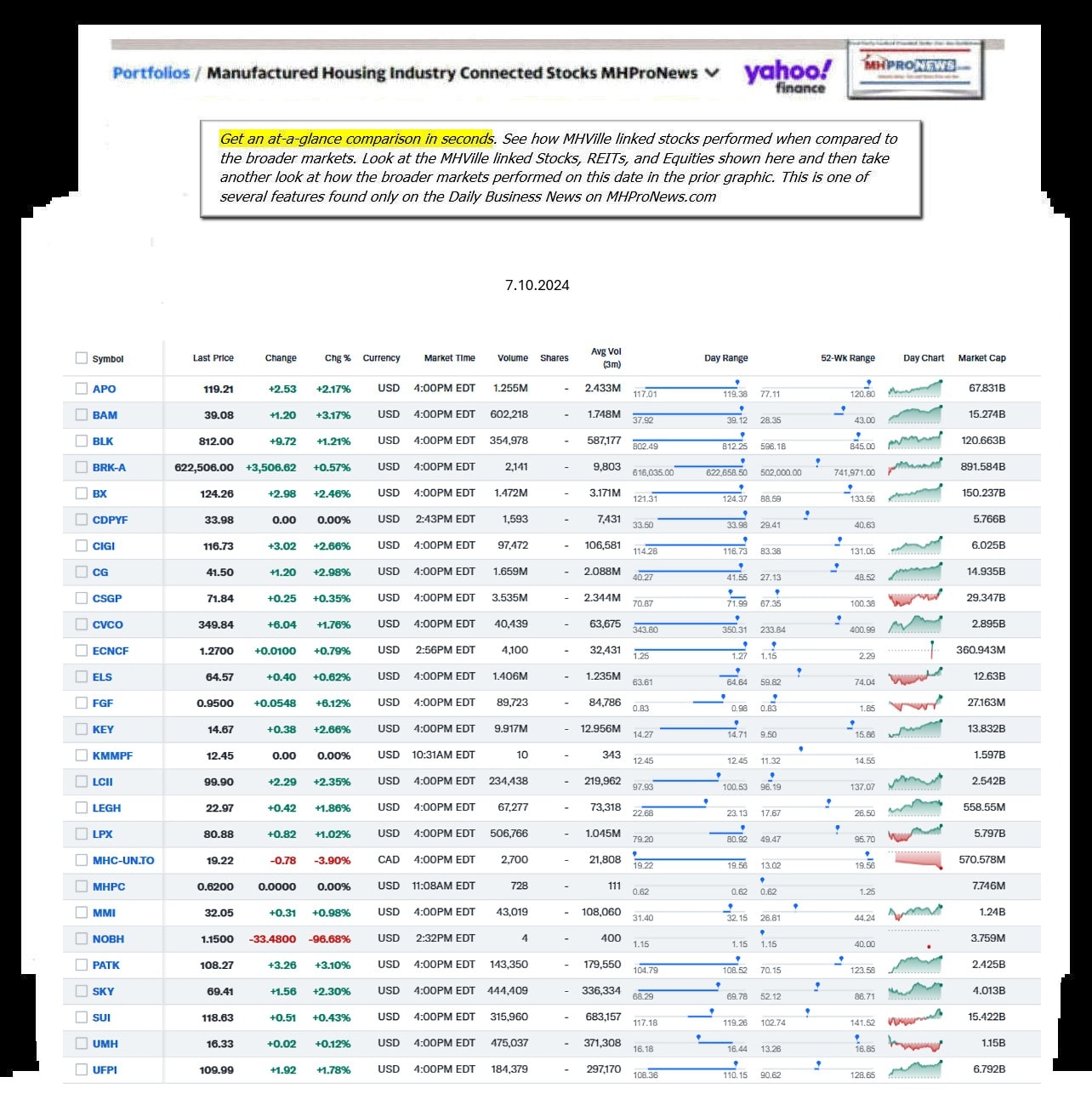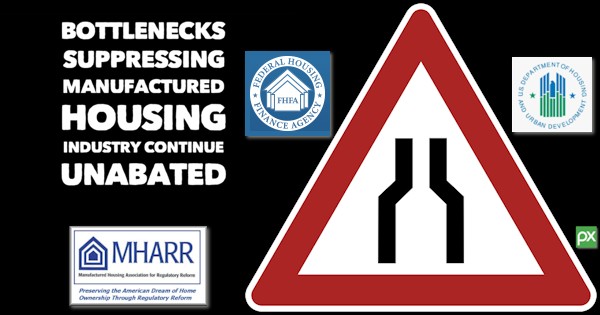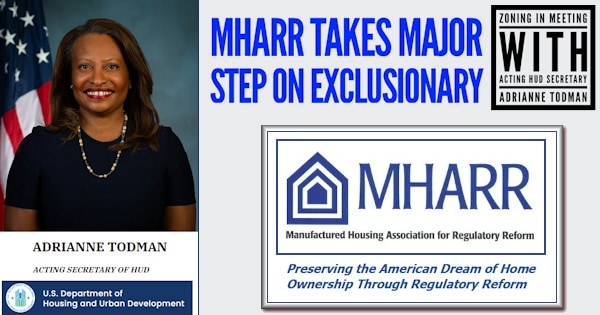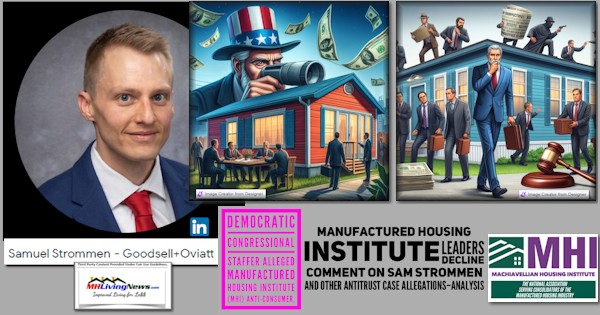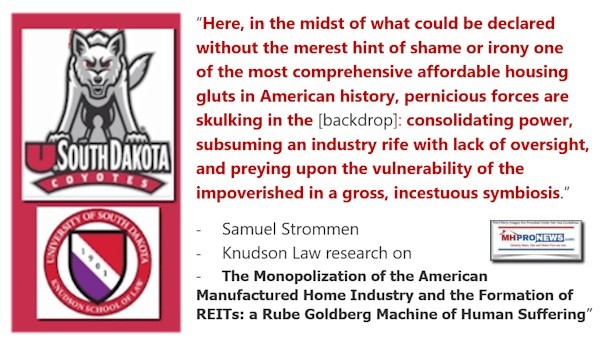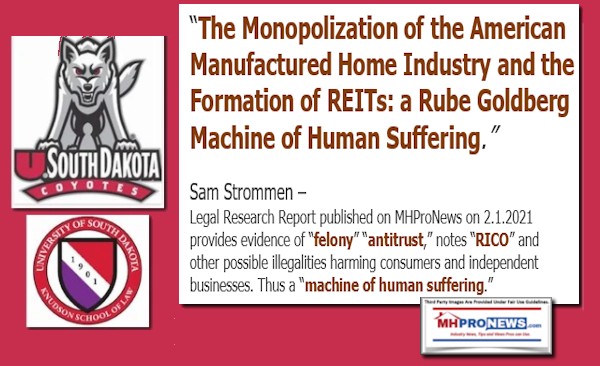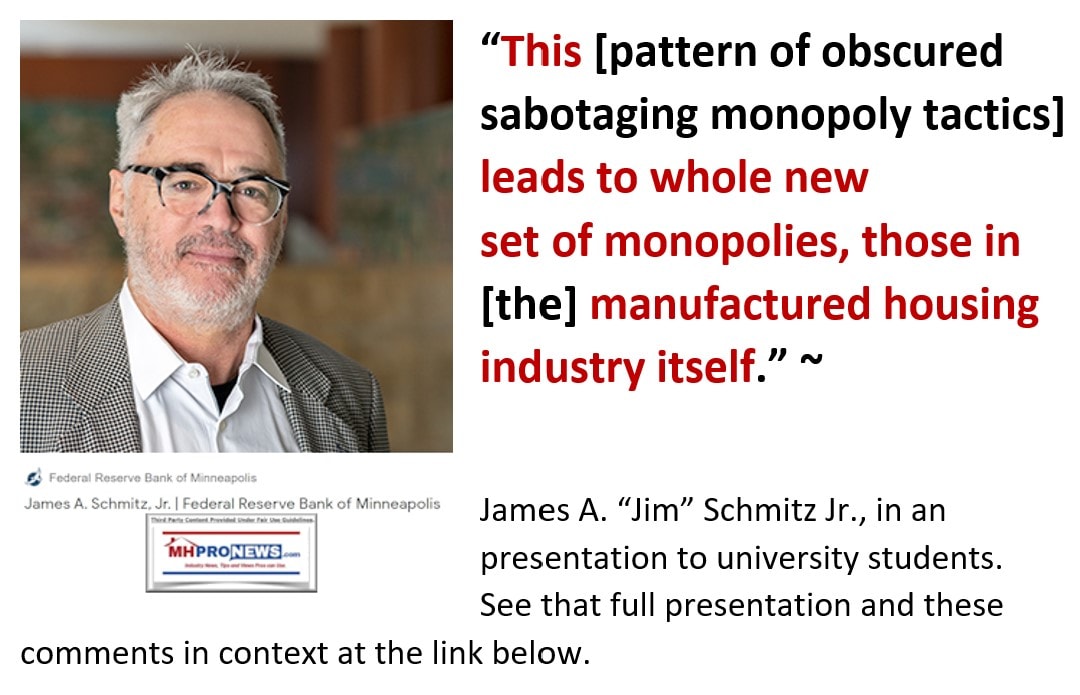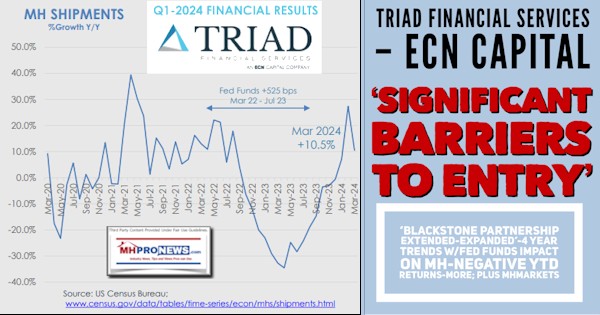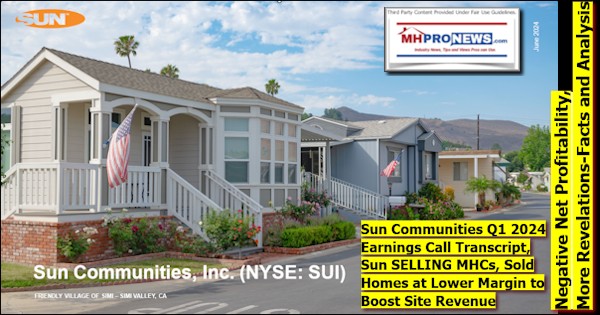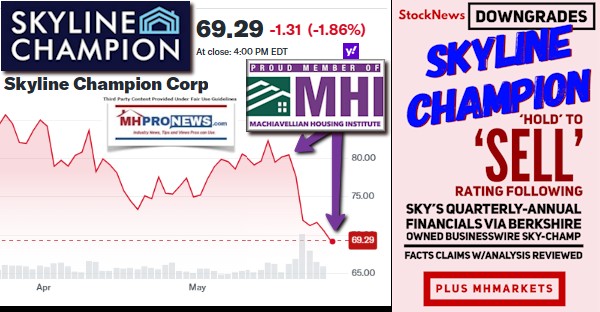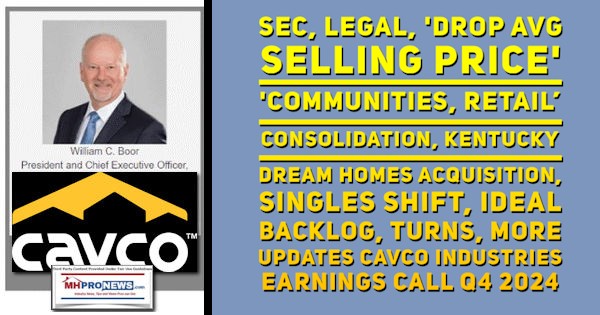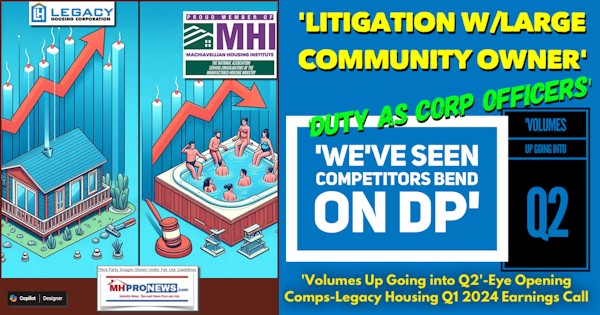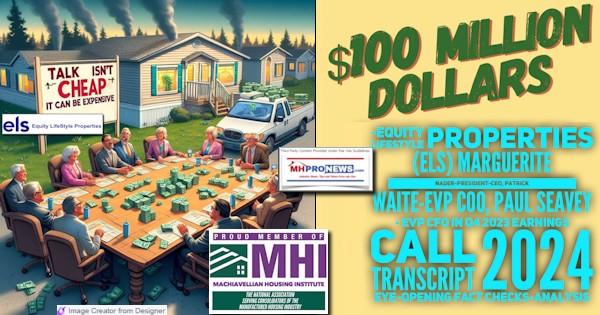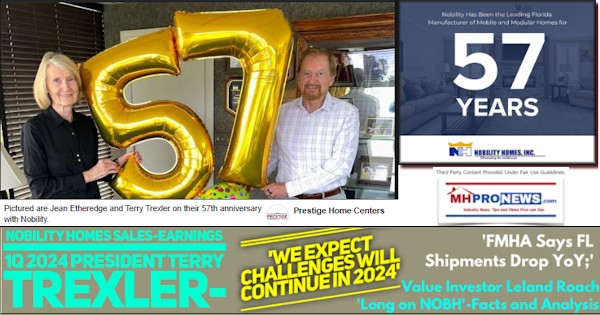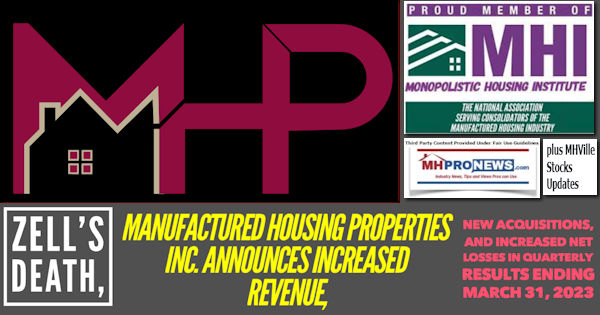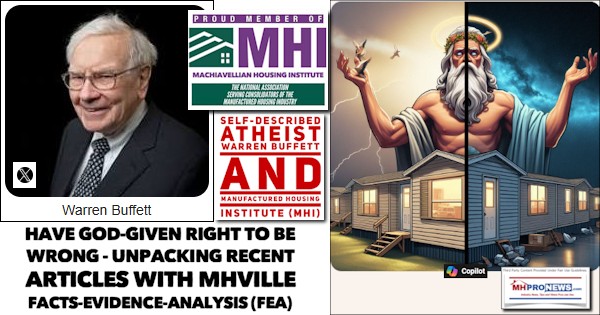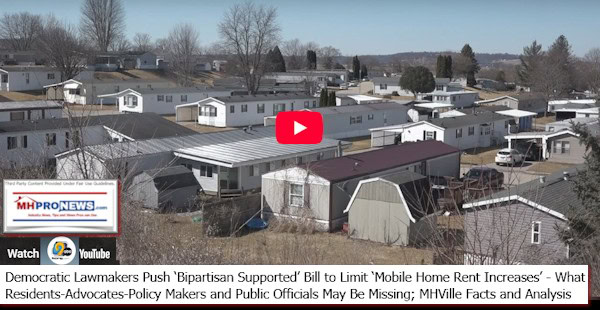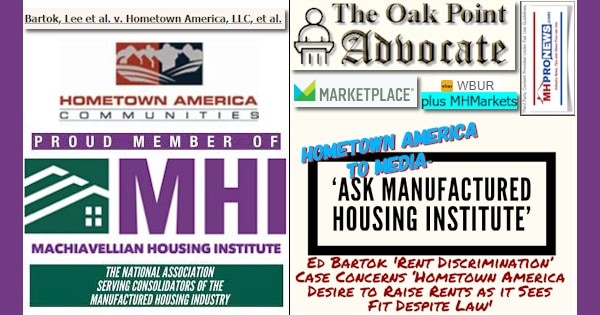
When Edwin Bartok and his wife Rose retired from the U.S. Air Force they sold their single-family house and decided to spend their retirement in a manufactured home community owned by Hometown America, said Marketplace.org. “We’re very, very happy,” Ed Bartok said. “We love the little house. It’s perfect.” But: “the Bartoks found out some of their neighbors were paying hundreds less in rent — apparently in violation of state law. So, Ed Bartok and a resident at a different park sued the owner, Hometown America, which owns roughly 80 mobile home parks across the country and a handful in Australia.” Their lot rent was reportedly “just $650” monthly. Marketplace said Bartok’s case is “the second lawsuit Hometown America has faced in the state, which bans price discrimination in parks. In 2020, the state’s highest court ruled against Hometown and upheld rent uniformity.” That media outlet said that Hometown America “declined to comment because of the ongoing lawsuit and redirected questions to Lesli Gooch of the Manufactured Housing Institute. She said price uniformity comes with unintended consequences.” So, it seems that MHI CEO Gooch has become a periodic de facto spokesperson for Hometown America? Why didn’t Hometown refer media inquiries to their attorney for comment?

In that world view, MHI and Gooch are tools for what an MHI insider called the “f-cking greedy” who have taken control of the trade group since Chris Stinebert exited as its president and CEO. Is it any wonder that MHI has memory holed former officials Stinebert, Gail Cardwell, and Thayer Long, among others?
Rios is the author of the informative article for Marketplace, which is linked here. Per Rio’s narrative in that digital publication is the following in Part I. Additional information with expert analysis and commentary will follow in Part II.
The macro- and MHVille-linked equities report updates are found in Part III.
Part I – Per Simon Rios via Marketplace.org

That’s because over time, having to equalize rents would result in higher prices for those least able to afford it, Gooch said.
But there’s also big money at stake for park owners. In court documents, Hometown claims the inability to raise rents for new residents, at one park, could cost it $81 million over two decades.
“This is going to sound bad, but you want to extract as much money from customers as a pool as you can,” said Eric Dolansky, a marketing professor at Brock University in Canada. “And you do that by getting the customers who are willing to pay the most.”
Dolansky said charging different prices for the same product is typical, like when a new iPhone comes out, the most enthusiastic customers pay most to get it first, then prices go down over time.
But smartphones and ballgames are one thing. Dolansky said there are ethical questions when you’re talking about a basic human need.
“The government will step in where they feel that, for example, there may be predatory practices, in situations where it is something that is needed by everyone,” Dolansky said.
Like a place to live.
In addition to making its case in court, Hometown America is trying to change Massachusetts law to do away with price uniformity.
And Ed Bartok, the park resident, said mobile homes are a great way for retirees like him to live affordably.
“The state has been talking a lot about affordable housing,” Bartok said. “Well, how about modular or manufactured homes?”
And Hometown America agrees; the company just said it wants to be able to raise rents as it sees fit. ##
Part II – Additional Information with More MHProNews Analysis and Commentary
1) So, per Eric Dolansky, a marketing professor at Brock University in Canada, “The government will step in where they feel that, for example, there may be predatory practices, in situations where it is something that is needed by everyone.” Bartok clearly likes his manufactured home. His issue is apparently Hometown America charging different rates for his site than others, in apparent violation of state law.
2) Per CaseText, Bartok’s lawsuit against Hometown has already yielded the following.
Opinion
CIVIL 21-10790-LTS
12-21-2023
EDWIN BARTOK, et al., Plaintiffs, v. HOMETOWN AMERICA, LLC, et al., Defendants.
ORDER ON DEFENDANTS’ MOTION FOR PROTECTIVE ORDER (DOC. NO. 158)
SOROKIN, J.
Defendants move for a protective order to limit disclosure of the annualized income statements of Hometown Oak Point I, L.L.C. and Hometown Oak Point II, L.L.C. (“Annualized Income Statements”). Defendants bear the burden to establish “good cause” for the protective order. Fed.R.Civ.P. 26(c). Defendants contend the information at issue is not otherwise public, that it is “essentially a detailed explanation of the Community LLCs’ business model”, and that disclosure would both provide “competitors an undue competitive advantage” in attracting prospective residents and “incentivize[]” vendors to change the vendors’ costing structure. Doc. No. 159-1 ¶¶ 4-6. Under the totality of the circumstances, this showing fails to establish good cause. First, Defendants raised a significant and meaningful issue in the case: whether one of Plaintiffs’ proposed remedies would cause a reduction in services and amenities at the Hometown communities. The class representatives-as well as the actual and potential members of the class-are entitled to the information forming the basis for analysis of that issue so that they can evaluate the issue for themselves. Similarly, this information will form at least some of the basis for the Court’s resolution of the issue. And ordinarily, the public has a right to know the grounds for judicial decisions. See, e.g., United States ex rel. Nargol v. DePuy Orthopaedics, Inc., 69 F.4th 1, 15 (1st Cir. 2023). Next, both entities operate in a rent-controlled environment, which means that the information at issue has substantive legal relevance and renders much of it subject to disclosure even though to date the information has not been made public. All of these considerations, as well as the reasons supporting the Court’s prior ruling requiring disclosure of the rent rolls, Doc. No. 145, outweigh the considerations Defendants advance to support their proposed protective order.
Defendants knew this prior to acquiring the communities.
Moreover, the Court notes that the community level financial information is fairly generic without further underlying detail (e.g., revenues, payroll, debt service). The Defendants have not established that information of this nature is unavailable to competitors based upon their experience in the industry, communications with consultants, review of industry publications, or discussions with the various types of participants in the industry. Nonetheless, Defendants have demonstrated a basis for a much narrower protective order. Use of the Annualized Income Statements is limited to purposes of this litigation and these documents shall bear the legend “This document may be used only for purposes related to Bartok v. Hometown America, L.L.C. et al., U.S.D.C. C. A. No. 21-10790-LTS.” Accordingly, the Motion is DENIED except to the extent described herein.
SO ORDERED.
3) Per Rios via WBUR on June 17, 2024:

“We’re very, very happy,” Ed Bartok said, showing off the garden and bird feeders adorning their backyard. “We love this little house.”
One of the best things, Bartok said, is the price.
But a controversial state law governing prices for mobile home lots has led to a big-stakes battle, pitting park residents against owners. Under the decades-old law, owners must charge all residents the same rent, rather than raising rates for newcomers. Some park owners argue the rule threatens the model of manufactured housing communities, while many residents say price uniformity keeps the housing affordable.
“The state has been talking a lot about affordable housing,” Bartok said. “Well, how about manufactured homes?”
When the Bartoks first moved into the Athol park in 2016, their monthly rent was around $650. They soon learned some of their neighbors were paying hundreds less — apparently in violation of the law requiring uniform prices.
“No one has twice the lot that someone else has,” Bartok said. “We all get water and trash [removal] and taxes … We should all be paying the same.”
The Bartoks have teamed up with a resident of a Middleborough park to sue their common owner: Hometown America. The Chicago-based company’s portfolio includes six parks in Massachusetts and 80 across the country, in addition to parks in Australia. The plaintiffs hope to add hundreds more current and former residents to their suit.
Price ‘discrimination’
The lawsuit is the second the company has faced in the state over so-called price discrimination. In a case decided in 2020, Blake v. Hometown America, the state’s Supreme Judicial Court ruled that state law requires uniform rents at mobile home parks. Even so, Hometown continues to fight the matter — making its case in the courts and pursuing a solution in the Legislature.
“We think the SJC’s ruling is contrary to common sense and decades of practice, and it cannot be implemented without creating a slew of problems,” said Hometown attorney Lisa Goodheart, speaking before state lawmakers in 2021.
The company says when it began buying parks in Massachusetts, it left existing rent structures in place, and charged higher market-based rents to new arrivals. Despite the high court’s ruling, Hometown argues it should be able to charge a new couple moving in more than a senior who’s lived at a park for many years.
So Hometown is now trying to change the law.
Executives of the company declined to be interviewed. They referred a reporter to the Manufactured Housing Institute, a lobbying group. The institute’s chief executive, Lesli Gooch, argues there’s an unintended consequence of forcing parks to charge everybody equally.
“This idea, while good on its face: ‘Isn’t that nice? Everybody pays the same rent,’ it does impact the ability to manage the community over time in a way that is going to keep it … somewhere that’s desirable to live.”
Gooch said Massachusetts is an outlier for not allowing owners to set higher, market-based rents for newcomers. She said a handful of other states require increases to be uniform, but don’t require all residents be charged the same amount.
For Hometown, there’s big money at stake. In court filings, the company claims at the Middleborough park alone, it could lose $81 million in rents over two decades if it can’t charge new residents more.
Marketing professor Eric Dolansky, at Brock University in Canada, says charging different prices for the same product is typical of many businesses. “This is going to sound bad, but you want to extract as much money from customers as a pool as you can,” Dolansky said.
But should price discrimination be allowed in the housing market? He said it’s one thing when people are willing to pay extra for tickets to a ball game, or to hail an Uber during rush hour. Ethical questions can arise, Dolansky said, when you’re talking about a basic human need.
“The government will step in where they feel that, for example, there may be predatory practices, in situations where it is something that is needed by everyone,” he said. “People need a place to live.”
Advocates for park owners say the ability to charge different rents would protect the people who can least afford to pay. Raising everybody’s rent equally could have devastating consequences for residents who might have nowhere else to go if they were priced out of a park.
While Hometown is a national player, some small, local park owners also complain the price uniformity rule hurts them.
A bill on Beacon Hill
Hometown America has shown it’s ready to spend a lot to do away with the current rent system in this state, and not just on lawyers locked in years of litigation, but on lobbyists — and a politician in Quincy. State records show Hometown has shelled out more than $300,000 to lobbyists registered in Massachusetts since 2021. That’s on top of at least $3,000 in donations by company executives to state Rep. Tackey Chan, campaign finance records show.
The Quincy Democrat is the lone sponsor of a House bill that would end rent uniformity. And if it passes, the lawsuit against Hometown could go away, along with $30 million in potential damages.
Chan is perhaps an unlikely ally to the owners: there are no mobile home parks in his district. Yet he’s filed the bill for the last four sessions, and in March it emerged from the housing committee. …
““They’re requiring that all contracts for lease of use of individual segments be essentially simultaneous, regardless of time of signing a contract,” he said. “The bill I filed tries to address that issue — to bring manufactured housing agreements into current contract laws. …”
“Hometown’s majority investor is a public pension fund from the other side of the country. The Washington State Investment Board — a fund for state retirees — controls 87% of the private company through a real estate fund, according to a spokesperson for the fund. …”
“A spokesperson for the pension fund told WBUR it does not comment on specific investments within the fund’s portfolio. Nor would Hometown comment on its connection to the pension fund.
The company said it’s invested here to provide quality housing at affordable prices. But that will be harder to do, according to Hometown, if it’s barred from raising rents the way it sees fit. ##

4) The Oak Point Advocate provides additional details about the lobbying that Rios’ report stated Hometown America has been engaged in. Their website says: “The Advocate is an online news and information portal, managed by a group of homeowners who reside at the Oak Point Community in Middleborough Massachusetts.” True to that description, an array of documents and information is available from that source. Per the Oak Point Advocate, the following.

-
- H1302 is a bill submitted by Massachusetts State Representative Tackey Chan of Quincy on 1/19/2023, and pending in the current legislative session.
- The bill was submitted by Representative Chan as a result of a lobbying campaign by Hometown America that began in 2016.
- H1302 eliminates a key rental provision of Massachusetts General Law Chapter 140, Sec. 32L(2). That section of the law currently states:
- In contrast to the current law, the proposed bill would permit property owners of manufactured home communities to charge new tenants rental fees that exceed what other tenants are paying, and the change to the law would be applied retroactively.
- Hometown America is the property owner at the Miller’s Woods and Oak Point manufactured home communities and currently the defendant in the lawsuit Bartok v. Hometown America brought by members of those communities. Bartok is the second class action alleging violations of Sec. 32L(2) at Hometown properties in Massachusetts.
Kyle Howieson, regional manager of Hometown America, stated the following in his email to Oak Point homeowners on 6/21/2024:
The final paragraph in his email included the following sentence:
In response, the following represents not only the opinions, but also the observations and concerns of many Oak Point homeowners based on their research of H1302.
- According to The Attorney General’s Guide to Manufactured Housing Community Law, the courts have recognized that manufactured housing communities “provide a viable, affordable housing option to many elderly persons and families of low income.”
- The lease in a manufactured home community like Oak Point is unlike other residential property leases.
- There is no up-front maintenance required by the landlord for the new tenant.
- The monthly rent for each lot at Oak Point is already subject to an annual increase. To provide the landlord with a reasonable net profit, the local rent control board regulations allow rent adjustments that are “based on the application of a yearly consumer price index factor.”
- Absent in Hometown’s email are details regarding how homeowners would benefit from the law being amended retroactively so that property owners need not charge all tenants the same rental fee, or how residents would be harmed if all homeowners paid the same monthly rate as those with the lowest rent.
- Large corporations like Hometown, with shareholders who expect a significant return on their investment, have an incentive to maximize their profits, even at the expense of the long-term interest of homeowners.
- Hometown America certainly recognizes that homeowners in a manufactured home community cannot simply leave their home when costs become prohibitive. Unlike traditional tenants, manufactured housing tenants must sell their home in order to relocate, which confers tremendous economic leverage upon community owners.
- Based on the increased rent that can be charged to new tenants if the law is changed, will homeowners be unable to sell their homes, or will they be required to reduce the selling price, perhaps to a price below what is owed on their mortgage, to compensate buyers for the amount of the new monthly lease?
- Will an inability of homeowners to sell homes at a price sufficient to pay the existing mortgage result in an increased rate of mortgage defaults, and will this cause banks and other financial institutions to stop lending money to purchase homes in a manufactured home community?
- If the law in Massachusetts is changed, and as a result manufactured home communities become predominantly owned by large corporations with shareholder expecting significant returns, will seniors, retirees and families of low income no longer have the option to move into affordable manufactured home communities?
- Is the current law indicative of the fact that manufactured home communities were never intended to be profit centers for large corporations, in the same way that hospitals were never intended to be profit centers? And will manufactured home communities and their residents suffer similar consequences if the current law is weakened?
- Finally, should H1302 enable highly profitable corporations, with the financial resources to spend hundreds of thousands of dollars lobbying legislators on behalf of this and similar bills, to maximize their profits at the expense of homeowners and shield them retroactively from the legal and financial consequences resulting from violating the current law?
House bills and Hometown’s lobbying to change the law
The Blake lawsuit was decided in favor of the plaintiffs of the Oakhill manufactured home community in their lawsuit against Hometown America. The court and a subsequent appeals court ruling determined that residents of a manufactured housing community who lease similar lots and are provided similar amenities must be charged similar rents.
Since 2016, Hometown America has been employing lobbyists and making campaign contributions to state legislators to repeal or amend that state regulation — Massachusetts General Law Chapter 140, Sec. 32L(2), which states:
“Any rule or change in rent which does not apply uniformly to all manufactured home residents of a similar class shall create a rebuttable presumption that such rule or change in rent is unfair.”
- Public records provided by the Massachusetts Office of Campaign and Political Finance reveal that beginning in 2016, the President and CEO of Hometown America (Stephen Braun) and the Chief Investment Office (Patrick Zilis) made campaign contributions to State Representative Tackey Chan of Quincy, State Representative James Arciero of Westford, and State Senator John F. Keenan (Norfolk and Plymouth County).
- Representative Chan has repeatedly filed legislation to repeal Sec. 32L(2) beginning with H3006, a bill he filed in 2017.
- In 2019 Representative Chan filed a similar bill H1258.
- Representative Chan later moved to amend House Bill 5007. The amendment would modify Sec. 32L(2), striking out the words “or change in rent”, and would apply retroactively.
- In January 2023, Representative Chan filed H1302, to amend retroactively 32L(2) and strike out the words “or change in rent”. The bill was reported favorably by committee on 3/14/2024 and referred to the committee on House Steering, Policy and Scheduling.
- In response to H1302 and the favorable committee finding, the Manufactured Home Federation of Massachusetts (MHFM) sent an email to members of its organization, recommending members contact legislators to register their disapproval of the bill. A copy of the MHFM email was published on the Oak Point Homeowners Alliance website.
- Hometown America sent an email to homeowners on 6/21/2024 in response to the MHFM email and in support of H1302.
- Hometown America’s 6/21/2024 email included a hyperlink attachment to a photocopy of the letter that had been sent to the chairs of the Massachusetts legislature’s Committee on Housing by Lisa Goodheart of Fitch Law Partners on October 3, 2023 — a letter on behalf of Hometown America that supported H1302. The letter included an appendix that contained comments in support of Hometown’s position provided by Oak Point residents who had responded to the May 28, 2021 letter by Kyle Howieson to Oak Point homeowners regarding the Bartok lawsuit.
Lobbying Activity
(2021 – 2023)
Initially, Hometown promoted its legislative efforts through Attorney Rob Kraus and the firm Kraus and Hummel LLP. (All of this info is available through the Commonwealth’s Lobbyist Public Search Website). Since 2021, another team of lobbyists has been employed by Hometown. The public disclosure records listed below indicate that during the three-year period from 2021 thru 2023, Hometown America has spent over $233,000 lobbying Massachusetts state senators and representatives for legislative changes. According to public records submitted by Attorney Lisa Goodheart, Representative Chan, Representative Arciero and Senator Keenan are legislators whom she has lobbied on behalf of Hometown America. …”
The Oak Point Advocate provides downloads that link to documents that total hundreds of thousands of dollars in MA lobbying activity in the years 2021, 2022, 2023.
5) From Case 4:21-cv-10790-LTS pleadings linked here dated February 27, 2023 entitled: “ORDER ON DEFENDANTS’ AND PLAINTIFFS’ CROSS MOTIONS FOR PARTIAL JUDGMENT ON THE PLEADINGS (DOC. NOS. 78, 88)” says in part the following.
“The defendants argue that the timing of entry into lot rental agreements renders the plaintiffs not in a “similar class” under the statute, even if the lots rented are essentially the same with the same amenities. This contention is incorrect.”
“In light of the text of the statute as a whole, the Attorney General’s guidance, and the legislative history, we hold that time of entry into an occupancy agreement does not create a dissimilar class under § 32L (2). Such an interpretation would allow a manufactured housing community operator to completely circumvent § 32L (2) by creating a new class each time a new lease is signed, and remove the protections that the statute offers against unfair and nonuniform changes in rent.”
“Because the defendants have violated G. L. c. 140, § 32L (2), damages are governed by G. L. c. 93A.”
“Viewed together, these provisions of Chapter 140, §32L create a comprehensive structure to protect tenant rights. Subsection two creates a substantive legal standard against which to judge non-uniformity in rent, subsection six renders unenforceable any rules that violate subsection two, and subsection seven authorizes a cause of action to enforce the foregoing legal rights. Plainly, these provisions vest MHC tenants with substantive rights, which, in certain circumstances, afford them protection from non-uniform rent structures.”
“For these reasons, Defendants’ Motion for Judgment on the Pleadings is DENIED. Turning to the Plaintiffs’ Cross-Motion, the Court notes that even when viewing the matter under the defendant-friendly standard, the resolution of the issues remains the same. Therefore, the Court ALLOWS Plaintiffs’ cross-motion.”
“For the foregoing reasons, Defendants are not entitled to a § 3 exemption. At present, the Court makes no determination as to whether the rebuttable presumption under § 32L(2) has been met. …”
Leo T. Sorokin
United States District Judge”
6) Bartok vs. Hometown and related actions are obviously of importance to the parties involved. In some respects, it is a case involving ‘everyday Americans’ who are often retirees vs. a big corporation that per their own letter from Fitch Law Firm attorney Lisa C. Goodheart involves a national firm with a sizable MA state presence. Goodheart said on 10.2.2023 the following.
“Hometown owns and operates seventy-seven manufactured housing communities nationwide. It acquired its first community in Massachusetts in 2003. It now operates six communities in the state that have a combined total of nearly 2,000 homesites and thousands of residents. The communities are sited in the municipalities of Athol, Attleboro, Middleborough, Rockland, and Taunton. Five of Hometown’s communities are for residents 55+. The sixth is an all-age family community.”
The point has been made that when Hometown America purchased those properties, they presumably should have known the provisions of MA state law. That should have been part of Hometown’s due diligence process in buying those communities.
So, the arguments made by Hometown, their paid attorneys, management staff, and MHI’s CEO Gooch on their behalf in support of changes to the state law and to fight Bartok and other residents is to a certain extent is logically disingenuous. In the preface of this report MHProNews noted that: “They [Hometown America] are willing to invest hundreds of thousands of dollars in the near-term pursuit of what “Hometown claims the inability to raise rents for new residents, at one park, could cost it $81 million over two decades.”
7) But this Bartok vs. Hometown case can also be viewed as a battle being waged in a much larger conflict, one that is national in scope. Hometown America is one of several companies that have been named as defendants in national class action antitrust suits. More on this in the linked item that follows and further below
8) Among those parties in the Bartok vs. Hometown case is the “Manufactured Home Federation of Massachusetts” (MHFM) which asserts they are “Supporting Manufactured Home Residents in Massachusetts.” Among the prominent posts on their site, the MHFM has an item on the topic of: “Investors Are Buying Mobile Home Parks. Residents Are Paying a Price.” It aptly observers in part that: “Across the country, corporate landlords are expanding manufactured housing portfolios and driving up rents, pushing longtime residents out.” That is demonstrably accurate, as MHProNews and/or our MHLivingNews sister site have frequently detailed. But that MHFM post is to the left-leaning New York Times article that has blocked access for non-subscribers.
a) Based on past experiences, often media reports don’t detail the fact that those consolidators of the manufactured housing industry which are publicly traded often openly state in their investor pitches that a lack of new development of manufactured housing communities is part of their business model. Fellow MHI-National Communities Council (NCC) members to Hometown America include such firms as Equity LifeStyle Properties (ELS), Sun Communities (SUI), and Flagship Communities (MHC-U.TO). What ELS, for example says is that “There has been limited MH [manufactured home communities] development in the U.S. in the past 20 years. Growing demand coupled with almost now new supply is a strategic advantage of ELS.”
To see this image below in a larger size, depending on your device,
click the image and follow the prompts.
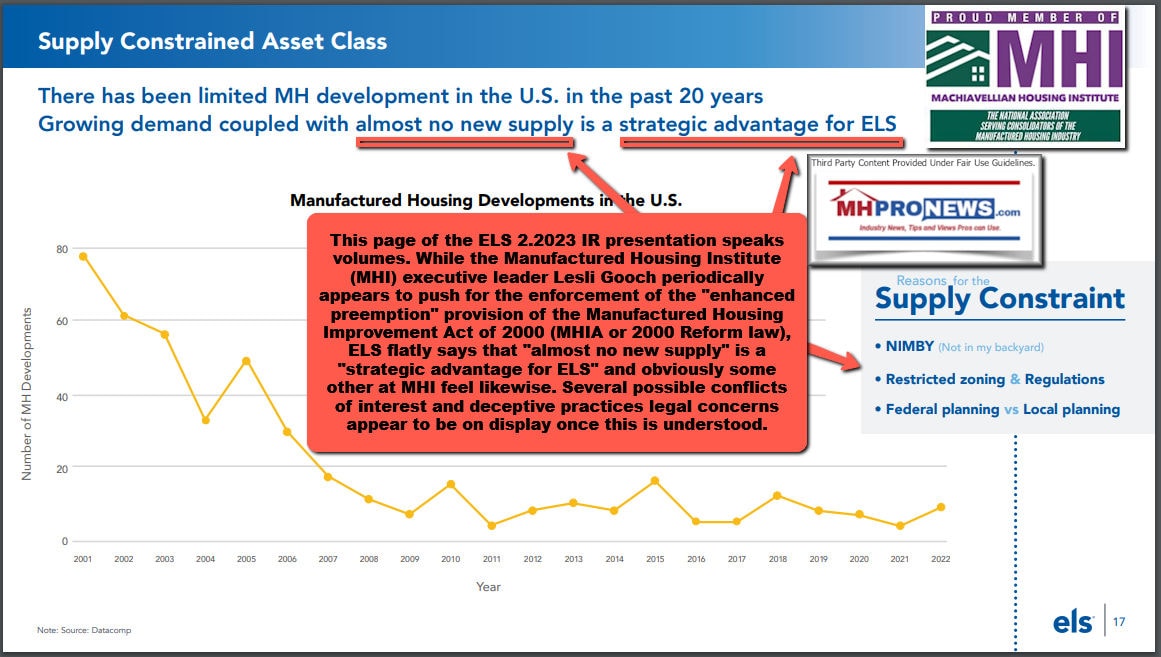
b) The late Sam Zell bragged to investors during an earnings call over a decade ago that they like the oligopoly nature of the manufactured home industry. An oligopoly can be a form of monopolistic behavior, which may violate antitrust laws, but is often more difficult to detect. 
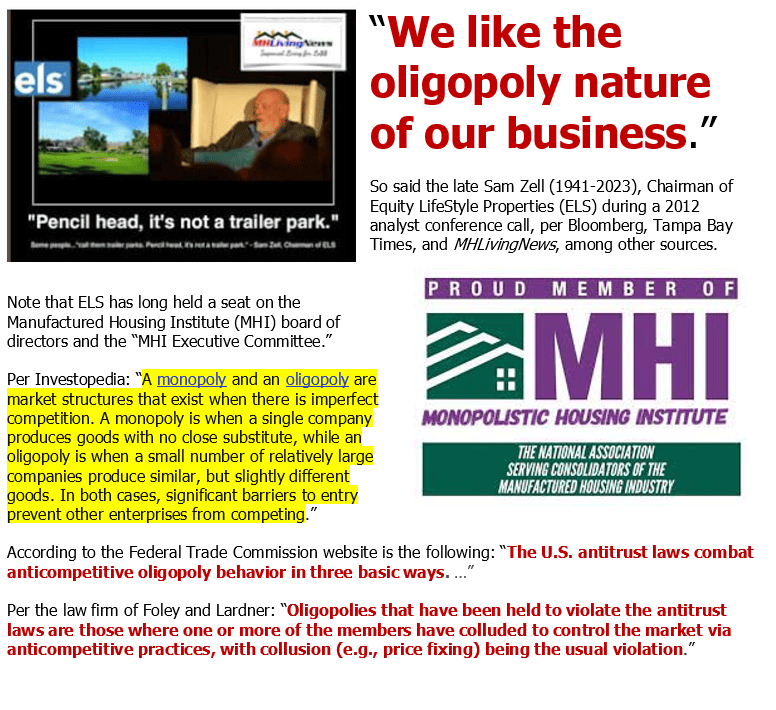
c) As noted above, it isn’t just ELS that brags to investors about limited new development. Fellow MHI member Sun Communities does so too. Per the investor relation (IR) pitch screenshot shown below, Sun – like ELS – said there has been “virtually no new supply” of newly developed manufactured home communities (MHCs) “added for years.” Curiously, Sun’s IR screen shot also adds the detail that in 2022 alone, Sun accepted over 55,000 applications for residency in a manufactured home community, yet their occupancy was at 96.2 percent as of June 30, 2023. With tens of thousands of applicants seeking affordable housing, why isn’t Sun actively developing more MHC properties? Why aren’t they already at full occupancy at their existing prosperities if they indeed took 55,000+ applications?
To see this image below in a larger size, depending on your device,
click the image and follow the prompts.
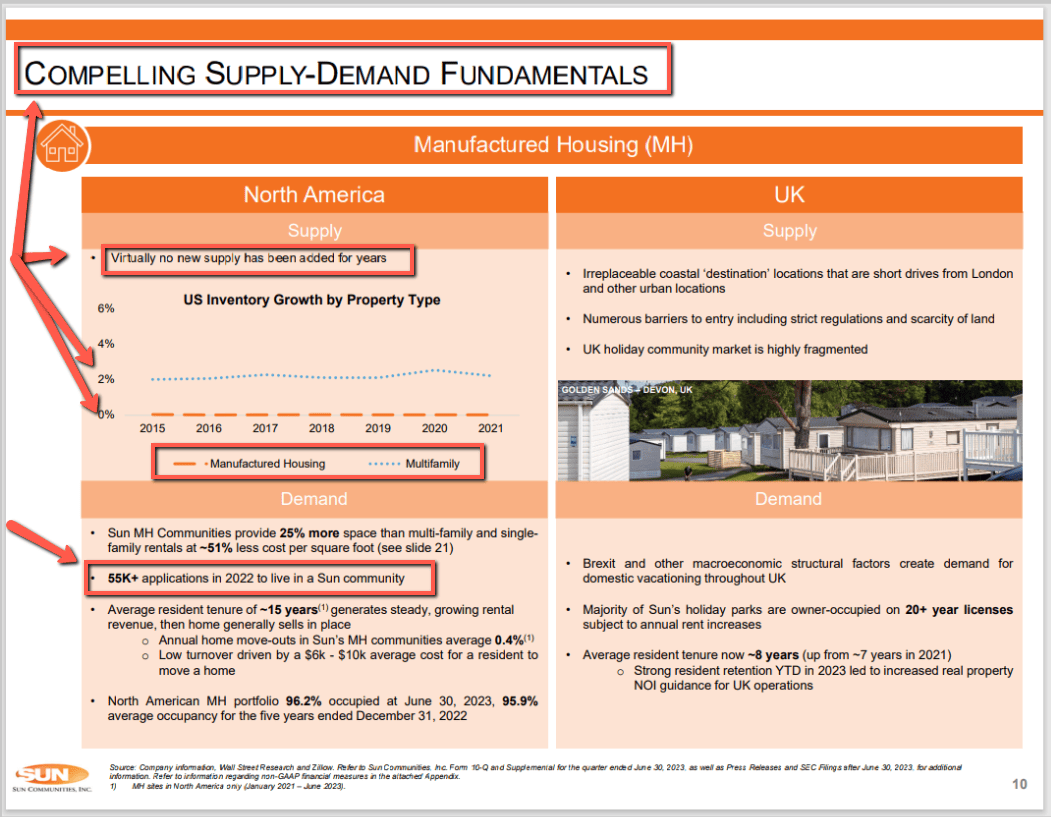
Note: depending on your browser or device, many images in this report can be clicked to expand. For example, in some browsers/devices you click the image and select ‘open in a new window.’ After clicking that selection, you click the image in the open window to expand the image to a larger size. To return to this page, use your back key, escape or follow the prompts.
d) While it may be unrepeated, after a series of exposes by MHProNews and the national class action litigation that has been launched, Sun’s leadership announced that they were not going to do more developing or acquisitions, at least as part of their current plan. Sun and Hometown America are both among those named as defendants in national class action litigation.

e) Perhaps because one of their principals – Nathan Smith – is a politically well-connected party leader, Flagship Communities, which also brags about the lack of development being an advantage, has not yet been named in the various class action cases that include ELS, Sun, Hometown America and others, several of which are either MHI members, and/or are members of an MHI connected state association affiliate.
To see this image below in a larger size, depending on your device,
click the image and follow the prompts.
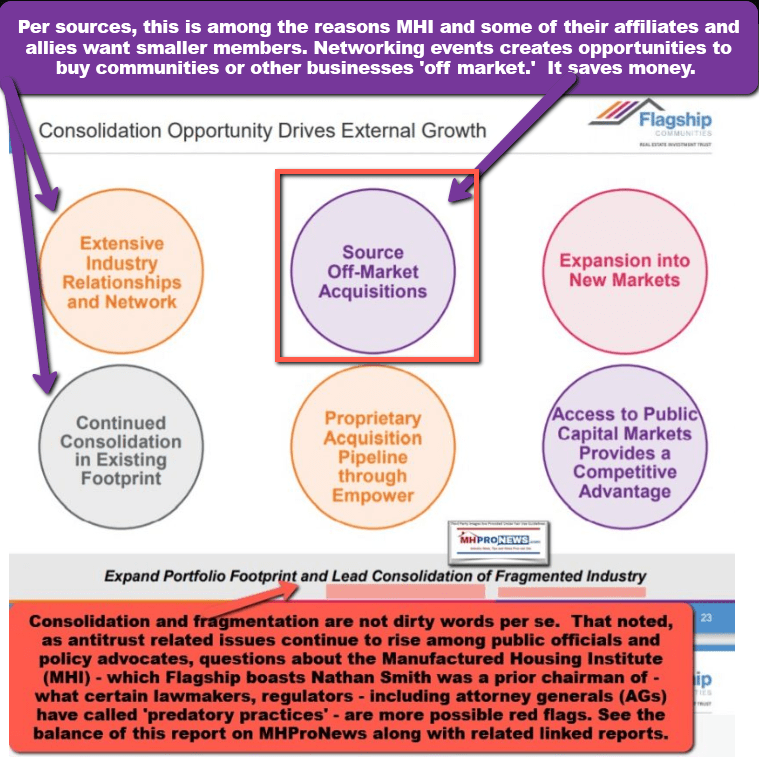
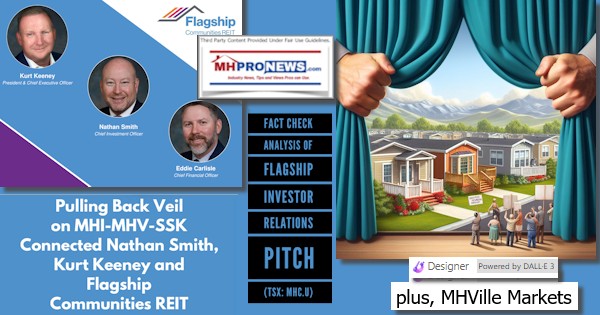
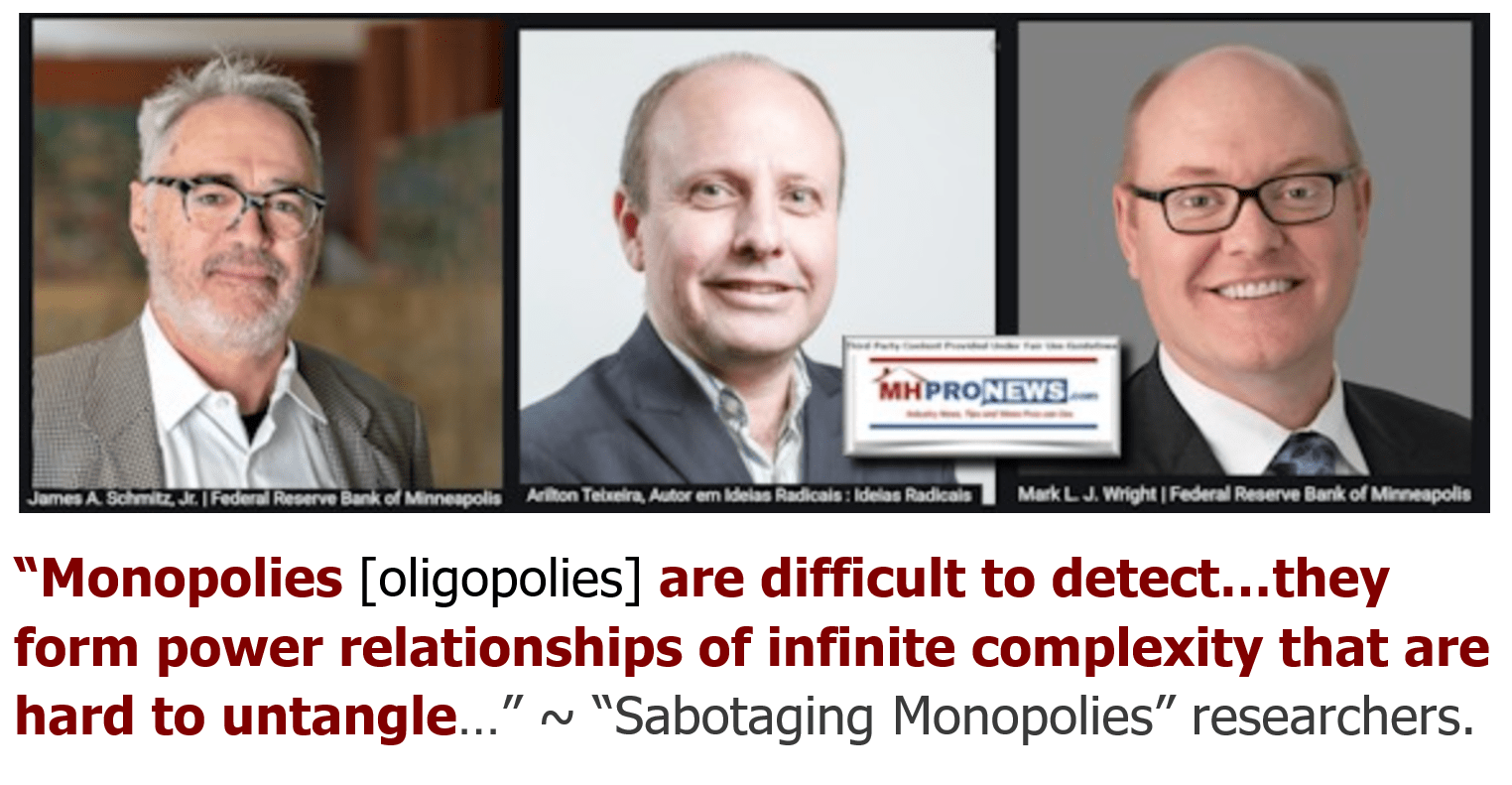
f) So, while residents like Bartok et al are understandably concerned with their own property and the management of that property, there is an evidence-based argument to be made that how their firm fits into the bigger picture, which the New York Times headline and teaser alludes. More specifically, is – for example – MHI leadership actively involved in efforts to consolidate the industry that they claim to be representing all segments of in their pitch for membership? Note that newer, smaller members are an apparent potential source for “off market acquisitions” that Flagship has bragged about to investors. Even though MHI has an antitrust statement, there is an evidence-based argument to be made that their antitrust document is little more than a legal fig leaf. MHI also has a ‘code of ethical conduct,’ which when carefully examined, curiously seems to ignore the various violations of that code of conduct by numbers of their consolidation-focused members who are accused of predatory behavior.
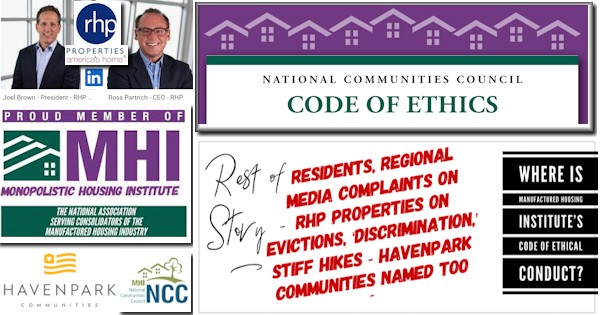
9) It must be stressed that not all manufactured home community (MHC) operators or other members are “predatory.” That said, some clearly face that allegation from their own residents/customers, from various media accounts, and from public officials (be they sincere or merely posturing). It should also be stressed that just because ELS, Sun, Flagship and others apparently believe that limiting development is to their advantage, that doesn’t necessarily make it true. Another MHI member, UMH Properties, recently came out during an earnings call and made the case that it was better for the industry and better for investors to develop new properties with new homes. These details ought to matter to residents, current or potential litigants, lawmakers, and public officials charged with enforcing antitrust and other laws.
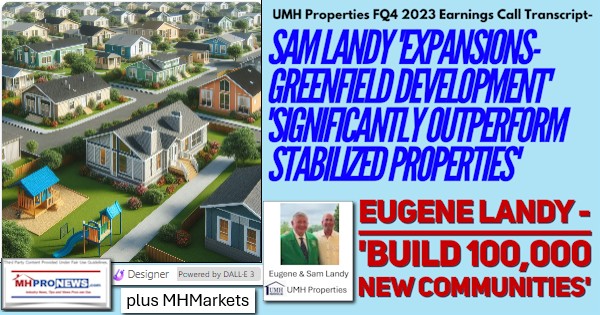
10) As was noted by various regional media and public officials above, the affordable housing crisis is well known and the potentially useful role that could be played by manufactured housing in that crisis is increasingly well understood by researchers and others. Massachusetts (MA) is a ‘blue’ state. In another ‘blue’ state of Minnesota, a bipartisan group of lawmakers studied manufactured housing and manufactured home community development. They determined that the most cost-effective way to develop new affordable housing was with manufactured homes. Manufactured homes were less costly per unit than even multi-family housing. So that stance taken by Sam and Eugene Landy (linked above) at UMH Properties is not only backed up by their own granular experiences over the course of several years, but is also further supported by the Manufactured Housing Working Group research in MN.
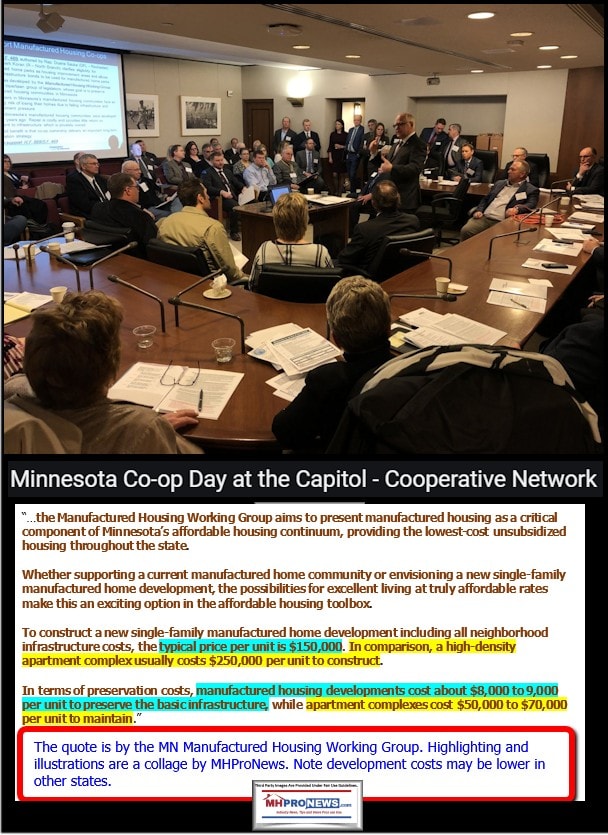
11) Another firm that has curiously not yet been hit with national class action litigation like ELS, Sun, and Hometown America (among others) has, are the business interests of Frank Rolfe and Dave Reynolds. Rolfe and Reynolds are among those who have argued against developing new manufactured home communities. Meaning, like ELS, Sun, Flagship and others, notorious Rolfe and Reynolds clearly hold to the notion that lack of new development plus consolidation of existing properties is a benefit to their investments.
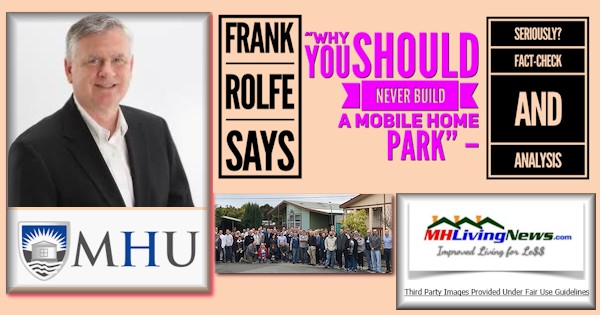
a) Rolfe is an oddity on several levels. On the one hand, his firm is a MHI member too. They are among the firms understandably charged with predatory behavior. The Rolfe-Reynolds linked entities clearly share certain commonalities with the larger consolidators of the industry. However, Rolfe periodically takes shots at MHI and politicians, among others. Rolfe recently slammed MHI but also slammed UMH/Landy’s stance that the numbers of manufactured home communities being developed should be dramatically increased. Rolfe called that UMH/Landy position that the industry should be doing more developing “asinine.”


b) The relevance of this to the Bartok vs. Hometown and other matters is this. The lack of new housing supply is routinely – and correctly – cited as part of the economic drivers for escalating housing costs. The fact that MHI appears to be ‘taking sides’ with consolidators in limiting industry production is at a minimum a conflict of interest among their members. But at worst, it may be an antitrust, RICO, or other violations of federal/state laws. More on that shortly.
12) Consider this Q&A with left-leaning Bing’s AI powered Copilot. The search inquiry was as follows. Note that prior to this article being published, on this date among the page one search results on Bing was the report linked here. Among the responses linked below by Copilot was MHLivingNews. New and returning readers should know that MHProNews has been doing clearly disclosed tests using Bing’s AI (later renamed Copilot) since May of 2023, routinely using the blue or balanced setting. The highlighting below is added by MHProNews to emphasize our sister site in the Copilot response.
Hometown America named in class action antitrust cases.
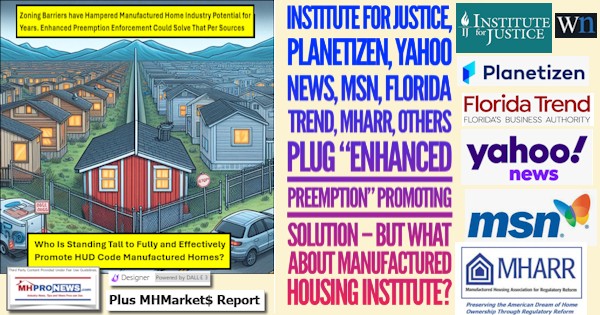
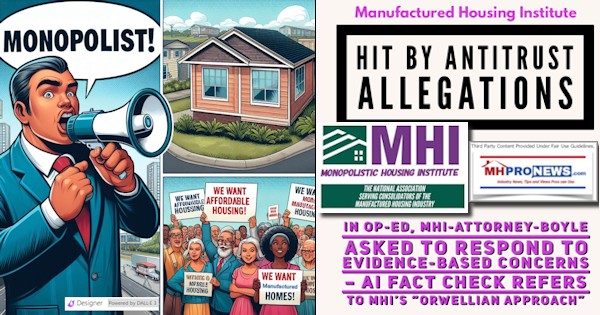
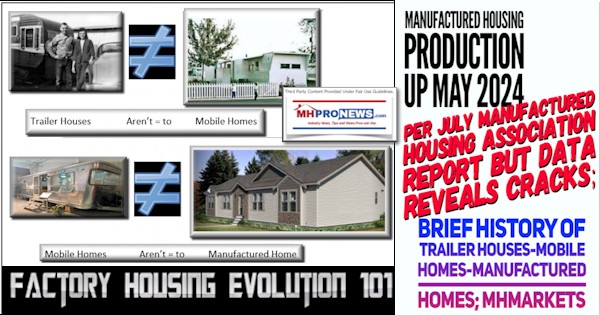
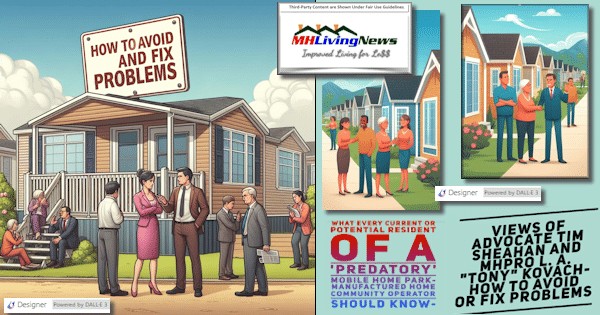
Part III – Our Daily Business News on MHProNews stock market recap which features our business-daily at-a-glance update of over 2 dozen manufactured housing industry stocks.
This segment of the Daily Business News on MHProNews is the recap of yesterday evening’s market report at the closing bell, so that investors can see-at-glance the type of topics may have influenced other investors. Our format includes our signature left (CNN Business) and right (Newsmax) ‘market moving’ headlines for a more balanced report.
The macro market moves graphics below provide context and comparisons for those invested in or tracking manufactured housing connected equities. Meaning, you can see ‘at a glance’ how manufactured housing connected firms do compared to other segments of the broader equities market.
In minutes a day, readers can get a good sense of significant or major events while keeping up with the trends that may be impacting manufactured housing connected investing.
Headlines from left-of-center CNN Business – 7.10.2024
- This headline function failed yesterday. MHProNews regrets the error and any inconvenience.
To see this image below in a larger size, depending on your device,
click the image and follow the prompts.
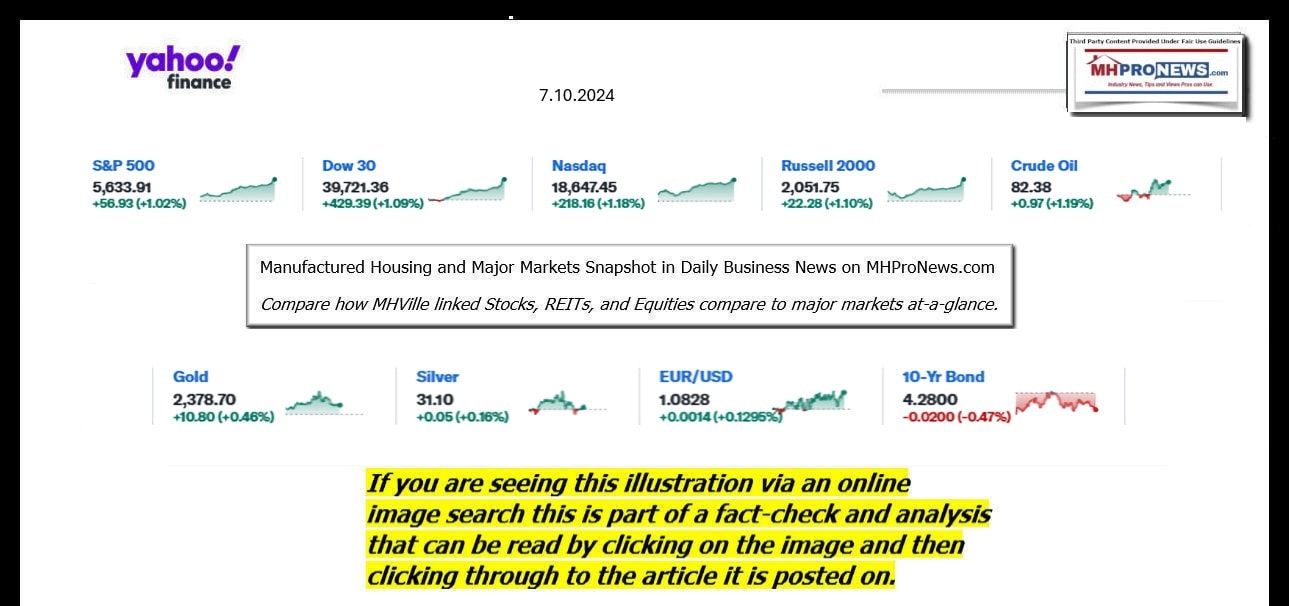
Headlines from right-of-center Newsmax – 7.10.2024
- This headline function failed yesterday. MHProNews regrets the error and any inconvenience.
click the image and follow the prompts.
